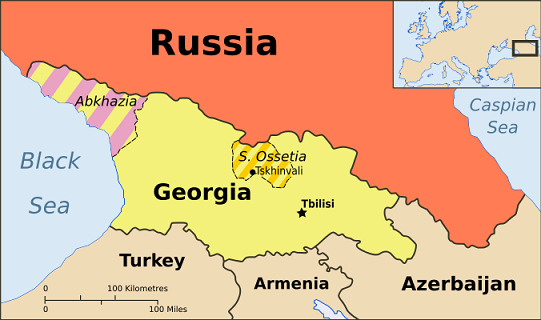
The one big question that I keep coming back to is what in hell possessed Georgian president Mikhail Saakashvili to start this war in the first place. Yes, this has been a crisis that’s been building for some time, with tensions having mounted again in the past month, but there was nothing going on that forced Saakashvili to escalate so drastically. What made him think invading South Ossetia was a good idea when he should know this would bring Russia in and the balance of forces never favoured Georgia, to say the least. As the events of the past few days proved, the Georgian army was no matchfor a serious Russian counteroffensive. Over at A FistFul of Euros, Douglas Muir speculated that it was a gamble on Saakashvili’s part, taking his chance to overrun South Ossetia before the Russians could mobilise:
South Ossetia has always been vulnerable to a blitzkrieg attack. It’s small, it’s not very populous (~70,000 people), and it’s surrounded by Georgia on three sides. It’s very rugged and mountainous, yes, but it’s not suited to defense in depth. There’s only one town of any size (Tsikhinvali, the capital)
and only one decent road connecting the province with Russia.
That last point bears emphasizing. There’s just one road, and it goes through a tunnel. There are a couple of crappy roads over the high passes, but they’re in dreadful condition; they can’t support heavy equipment, and are closed by snow from September to May. Strategically, South Ossetia dangles by that single thread.
So, there was always this temptation: a fast determined offensive could capture Tsikhinvali, blow up or block the tunnel, close the road, and then sit tight. If it worked, the Russians would then be in a very tricky spot: yes, they outnumber the Georgians 20 to 1, but they’d have to either drop in by air or attack over some very high, nasty mountains.
It is the sort of plan that is very tempting when the situation is right, if your own army is ready and willing and you can manage to find a situation in which the enemy is not. But it’s a high risk gamble, as we’ve seen again and it almost never pays off. In Georgia’s case, if Saakashvili did think this way and perhaps took Putin’s presence at the Olympics as a sign that Russia was distracted enough to risk the gamble, he made an awful mistake. He should’ve known the military commander on the gorund in North Ossetia also knows the facts as Doug sketches them above and that his first thought would beto get his troops through the tunnel as quickly as possible, just in case they do need to fight Georgian forces. Trying a blitzkrieg is the most obvious thing for the Georgians to try, so doubtlessly the Russians had contingency plans drawn up for this eventuality long ago.
But even had the Georgians succeeded in blitzkrieging South Ossetia, they still wouldn’t be in a good situation, as there still would be Abkhazia, the other, much larger breakaway region to content with. A Georgian victory would’ve brought them a long, slow guerilla war in South Ossetia and a Russian reinforced Abkhazia that would offer the constant threat of a second front. Which makes the decision to invade South Ossetia even more strange, with Abkhazia left alone. Perhaps Saakashvili thought that the latter was a lost cause anyway, even when conquered too easily invaded from Russia again and took the risk that had the gamble succeeded Russia would be content with bluster rather than military attack.
